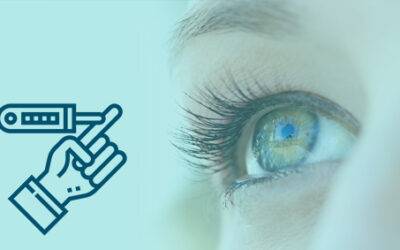Changes in Vision During Pregnancy – What You Need To Know

Introduction
P regnancy is a remarkable journey filled with numerous physical and hormonal changes. While most expecting mothers are aware of the common symptoms like morning sickness and fatigue, changes in vision during pregnancy often catch them off guard. Research indicates that up to 70% of women experience some sort of vision change during pregnancy that may occur due to hormonal fluctuations and other physiological transformations. Some of the vision changes may be subtle, while others may be more severe and an indication of a serious underlying health condition.In this article, we will delve into the topic of vision and eye changes during pregnancy, explore the symptoms, causes, prevention measures, diagnosis, and available treatment options. By understanding these aspects, expectant mothers can better navigate their journey towards motherhood and be better prepared to manage these changes with confidence and peace of mind.
Pregnancy Eye Symptoms – What are the symptoms of vision changes during pregnancy?
W hile most symptoms of changes in vision during pregnancy are usually temporary and resolve on their own postpartum (after childbirth), it is essential to recognize and address them promptly.Some common pregnancy eye and vision change symptoms include:
- Blurred vision – Blurry vision during pregnancy, which is one of the most common symptoms, can occur in one or both eyes. It may be worse at certain times of the day, such as in the morning or when tired, making it difficult to focus on objects or read fine print.
- Dry eyes – Hormonal changes can cause a decrease in tear production, leading to dry eyes and associated problems such as redness and irritation of the eyes.
- Sensitivity to light – Pregnant women may become more sensitive to bright lights, experiencing discomfort or even pain in well-lit environments. Migraines or frequent headaches can also be a result of light sensitivity and changes in eyesight.
- Increased eye pressure – Some women may experience increased pressure in the eyes, causing discomfort and occasional headaches.
- Corneal sensitivity – An increase in both corneal thickness and corneal curvature during pregnancy can make the cornea more prone to irritation and sensitivity, particularly in the third trimester. Although the sensitivity is generally not severe, some women may experience discomfort when wearing contact lenses.
- Double vision or distorted vision – can affect some pregnant women as a result of fluid leakage under the retina.
- Puffy eyelids – Bloating and puffiness during pregnancy may cause the eyelids to become puffy. This can affect peripheral or side vision.
- A sudden increase in prescription strength – Temporary refractive changes may cause some women to need higher strength prescription lenses or glasses during pregnancy.
- Seeing floaters, flashing lights, auras and blind spots in vision, or partial vision loss – This can be symptoms of serious complications of pregnancy that can affect some women with high blood pressure or gestational diabetes. If you experience any of these symptoms, it should be considered a medical emergency that requires urgent medical intervention.
Causes Of Vision Changes During Pregnancy
T here are a number of factors that can contribute to vision changes during pregnancy. The primary culprits are the hormonal fluctuations that occur to support the growing baby. Additionally, physiological changes in the body can impact ocular health.Here are some key causes of vision problems in pregnancy:
- Hormonal changes – During pregnancy, a woman’s body produces increased levels of hormones, such as estrogen and progesterone, which can affect the production of tears, the thickness of the cornea, and the pressure inside the eye. These changes can affect the eyes and visual function, leading to blurry vision, dry eyes, and other vision problems.
- Fluid retention – The body retains more fluid during pregnancy, which can lead to swelling in the cornea, causing changes in vision.
- Increased blood volume – The increased blood volume in the body during pregnancy may cause temporary changes in the shape and thickness of the cornea, affecting visual acuity.
- Gestational diabetes – Some women may develop gestational diabetes during pregnancy, which can affect vision if blood sugar levels are not well-controlled. Consistently high blood sugar levels can cause fluid to move in and out of the eye, which in turn can cause swelling of the eye lens and also affect the blood flow in the retina. This can lead to vision changes such as blurry vision, light sensitivity, and seeing floaters or flashes of light.
- Preeclampsia – This is a serious pregnancy-specific disorder involving high blood pressure, protein in the urine, and severe swelling that occurs after the 20th week of pregnancy. Preeclampsia can cause vision changes, such as blurry vision, light sensitivity, and seeing floaters, spots, or flashes of light.
- Weight gain – The extra weight gained during pregnancy can put pressure on the eyes, which can also lead to blurry vision.
How Are Vision Changes During Pregnancy Diagnosed?
I f you experience significant vision changes during pregnancy or are concerned about your vision during pregnancy, it is crucial to consult an eye doctor who can perform a comprehensive eye exam to determine the cause of your vision changes and recommend the best course of treatment. In most cases, any vision changes experienced during pregnancy are temporary and will go back to normal after childbirth. However, in some cases, vision changes may be a sign of a more serious underlying condition, and additional tests such as blood tests or imaging tests may be recommended.The diagnosis of pregnancy eye changes and symptoms may involve:
- Medical history – Your eye doctor will discuss your medical history, including any pre-existing ocular conditions or family history of eye diseases.
- Visual acuity test – This standard eye test measures your ability to see clearly and assesses the severity of any vision changes.
- Refraction test – This test determines the appropriate prescription for corrective lenses, if required.
- Intraocular pressure measurement – Elevated intraocular pressure may indicate glaucoma, a condition that can be exacerbated during pregnancy. This test determines whether the fluid pressure inside the eye is in the normal range of 12 and 22 mm Hg.
- Dilation of pupils – Your doctor may use eye drops to dilate your pupils, allowing a more thorough examination of the internal structures of your eyes.
Treatment Options for Vision Changes During Pregnancy
T he treatment approach for vision changes during pregnancy depends on the underlying cause and severity of the symptoms. In most cases, conservative management and lifestyle adjustments suffice. However, if the changes are severe or persist postpartum, further intervention may be necessary.Some treatment options for vision changes during pregnancy include:
- Artificial tears – Over-the-counter lubricating eye drops can keep your eyes moist and lubricated. This can relieve dryness and discomfort associated with dry eyes.
- Adjusting eyewear prescription – If your vision has significantly changed, updating your prescription glasses or contact lenses can help improve visual clarity.
- Monitoring blood sugar and blood pressure levels – If you have gestational diabetes or high blood pressure, close monitoring of your levels and medication may be required to help prevent vision complications.
- Surgical intervention – In rare cases where vision changes persist or are severe, surgical procedures such as refractive surgery may be considered postpartum.
- Lifestyle modifications – Resting your eyes regularly, practicing good eye hygiene, and avoiding excessive screen time can minimize eye strain and discomfort.
How To Prevent Vision Changes During Pregnancy
W hile some vision changes during pregnancy may be unavoidable, certain preventive measures can help maintain ocular health, reduce your risk, or lessen the severity of the changes.Here are some useful tips:
- Regular eye exams – Schedule routine eye examinations before and during pregnancy, even if you do not have any vision problems. This will allow your doctor to detect any pre-existing conditions and monitor your vision or any changes in your eyes early on.
- Monitor your blood pressure – If you have high blood pressure, it is important to monitor it closely and take steps to control it. This will help reduce your risk of developing preeclampsia, which can affect your vision.
- Manage blood sugar levels – If you have gestational diabetes, taking insulin medication, being physically active, and avoiding high-carbohydrate food and sugary drinks (that raise blood glucose quickly) can keep your blood sugar levels in the target range. This can prevent swelling of the eye lens that can lead to blurry vision.
- Follow a balanced diet – Maintain a healthy diet that is rich in nutrients like vitamin A, C, and E, as well as omega-3 fatty acids to support eye health. Avoid eating foods that are high in sodium and caffeine that can lead to water retention.
- Hydration – Stay adequately hydrated to combat dry eyes and ensure the proper functioning of your tear glands.
- Manage your weight – If you are gaining weight at a healthy rate, you are less likely to experience vision changes due to weight gain.
- Sun protection – Wear sunglasses with UV protection when outdoors to shield your eyes from harmful ultraviolet rays.
- Take care of your eyes – Make sure to get enough sleep, drink plenty of fluids, and avoid rubbing your eyes. If you spend extended time in front of digital screens, take frequent breaks and rest your eyes to reduce eye strain and minimize the risk of blurred vision.
Conclusion
P regnancy brings about numerous changes in a woman’s body and physical challenges, including vision changes. While it is essential to note that some changes in vision during pregnancy may be unavoidable, you can take steps to prevent or lessen the severity of these changes. Do not ignore or overlook significant or persistent vision changes during pregnancy, especially if you have any other health issues such as high blood pressure or gestational diabetes. Consulting an eye doctor can ensure you get the right treatment on time and prevent serious vision complications.
Read More Eye Care Blogs
4 Eye Problems That Can Result from Diabetes
If you are a diabetic, it means that the blood glucose or blood sugar in your body is too high. Most of the food you eat is broken down by your body into glucose - the main source of energy that is used for the various functions of the body. Insulin (a hormone made by...
Eye Safety at Home – Tips to Prevent Eye Injuries
ur homes are meant to be safe havens, but they can also be unexpected sources of danger, especially when it comes to eye injuries. Whether it's a mundane task like cooking, working in the yard or garden, Do-it-yourself projects, or even playtime...
Safeguarding Young Eyes – A Comprehensive Guide to Preventing Eye Injuries in Children
s parents, guardians, and caregivers, safeguarding our children's well-being is always at the forefront of our minds. Yet, amidst all the protective measures we take, we may inadvertently overlook a crucial aspect of their health - their eyes. Eye...



